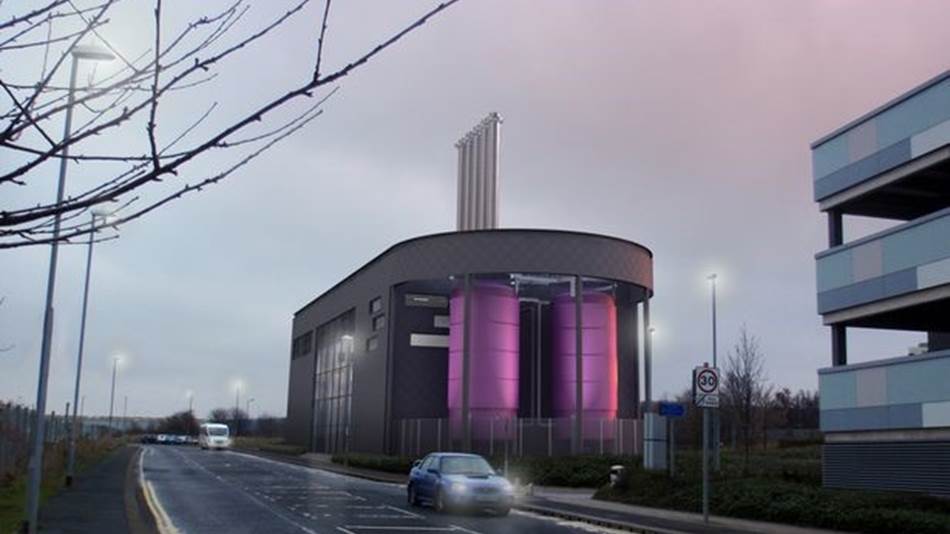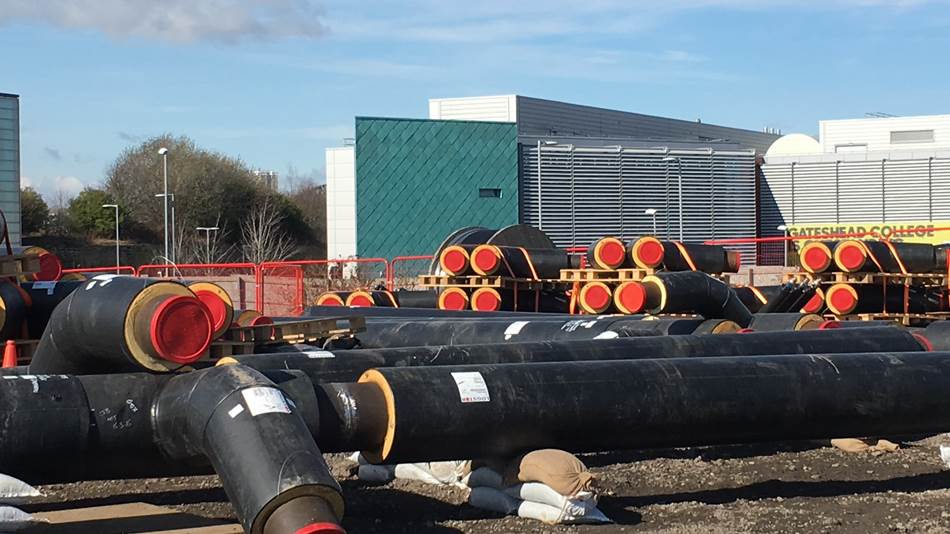Client: Gateshead Council·Contractscope: £2.5m· Timescale: 10 months
LOGSTOR contact· Christopher Hill, chr@logstor.com, +44(0)7788 284884
Designers/Project Managers: WSP | Parsons Brinckerhoff
Main Contractor: Clancy Docwra Ltd
- 2MW CHP energy centre
- Generating electricity to power 5,000 homes
- Installation of 3.5KM of pipes
Introduction
LOGSTOR, the world leader in pre-insulated pipe systems for district heating and cooling is the approved supplier for the new Energy Centre in Gateshead.
The Gas powered station will provide low cost electricity to landmark buildings and is part of Gateshead Council’s efforts to attract new business to the area, reduce emissions and cut energy bills. The Council was awarded £200,000 of grant funding from the Government’s Heat Network Delivery Unit. The 2MW combined heat and power energy centre will generate enough electricity to power the equivalent of 5,000 homes, and has the capacity to be expanded to 6MW.
Installation
LOGSTOR will install in the region of 3.5km of pipes across the new underground district heating scheme (with extensions planned for the future), over a period of 10 months and will use the Series 1 Conti (diffusion barrier) pipe system – to meet heat loss requirements across the project.
LOGSTOR pipes with diffusion barriers are leading-edge district heating systems and provide the best insulation and in turn make excellent economic sense.
Christopher Hill, UK Sales Manager for LOGSTOR: “This is a groundbreaking project which will be of enormous benefit, providing low cost heat directly to buildings and reducing reliance on traditional suppliers. “We are thrilled to be working in partnership with Gateshead Council and The Clancy Group to ensure the projects successful delivery, on time and to budget.”


Conti-Pipe Technology
During the manufacturing process for the LOGSTOR Conti pipes, the pipes are made by casting the insulation onto the service pipe in a moving mould, after which the casing is extruded onto the insulation. The production takes place in a continuous process.
An effective diffusion barrier foil, preventing diffusion of insulating gases, is embedded between the insulation and the casing. Consequently, continuously produced pipes with diffusion barrier foil do not age. The method is suited for pipes with outer casing dimensions 90 - 315mm.
The innovative production procedure of the Coni Pipe guarantees a constant foam density and thickness of the jacket pipe over the total pipe length. This results in opportunities to keep the energy efficiency of a district heating network high, and the heat-loss and CO2 emission low. The positive effects for the environment as well as for the expenses for network losses during the total lifetime are considerable.
The total heat loss is over a 30 year period is 10-25% lower than that of corresponding, traditional pipe. The smallest dimensions yield the greatest savings.
The pipes are supplied with two copper wires embedded in the polyurethane (PUR) insulation; these wires are used to identify any leaks in the system. The polyurethane (PUR) insulation has a guaranteed lambda value of 0.023 W/mK.
The advantages of Conti Steel pipe systems are:
- Reduction in the number of joints needed through the availability of long lengths
- Reduction in the number of bends/fittings needed as the piping can be factory curved to follow the best and easiest path
- Reduced operating costs due to diffusion barrier being fitted
- Fully welded system
- Alarm System
- Fully compliant with CIBSE CHPA Heat Networks Code of Practice
It is expected that the Energy Centre will start producing heat and power from summer 2016, when all the initial buildings will be connected up. The project value is circa £6million with the District Heating element valued at £2.5m.